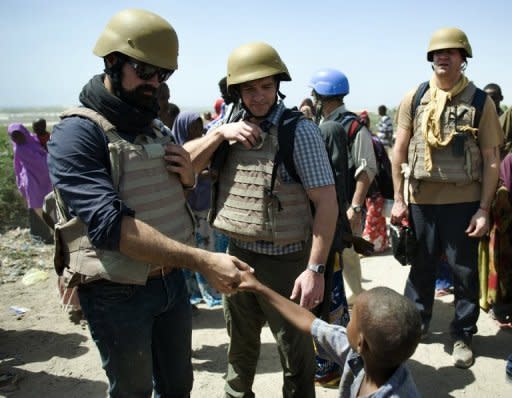Press baron, war reporter, critic: Evgeny Lebedev
Among the war reporters covering the brutal conflict in Somalia, one stands out: under his bulletproof vest, Evgeny Lebedev is also a British press baron and son of a Russian billionaire. "I just felt that I wanted to understand and see for myself," said 31-year-old Lebedev, owner of Britain's The Independent newspaper and the London Evening Standard, as he stared out at the Indian Ocean between military sandbags. Somalia's anarchic capital Mogadishu is not for the faint-hearted: the once elegant city has been left in ruins by two decades of bloody violence, and Al-Qaeda allied Shehab insurgents regularly launch guerilla attacks. The rattle of gunfire and the heavier crump of larger artillery are a near daily occurrence in Mogadishu, often dubbed the world's most dangerous capital. Foreign correspondents -- like aid workers and Western officials -- must travel the pot-holed streets in armour-plated vehicles, or be flanked by gun-toting guards to deter Islamist insurgent attacks. But Lebedev -- son of Russian banking tycoon and former KGB officer Alexander Lebedev -- is no stranger to tough reporting environments. Before Mogadishu, where he spent two days reporting stories for his newspaper under the protection of heavily armed African Union troops, Lebedev already reported in Afghanistan, spending time with President Hamid Karzai in September. After that he toured the Palestinian territories in December with Ismail Haniya, the Hamas prime minister in the Gaza Strip. Dressed in dark glasses, hat and grey Converse trainers, the youthful black-bearded newspaper proprietor is a special foreign correspondent for The Independent. "You need to be aware of what is happening in the world, and help draw attention to places that need such an attention, especially when real progress is happening," Lebedev said, admitting a preference for conflict areas. And Somalia, despite its dangers and daily violence, is slowly making progress: African Union troops forced Shehab fighters from positions last year, and continue to battle rebel positions on the edge of the city. Lebedev's arrival was preceded by a security reconnaissance team, investigating just how strong the heavily armoured personnel carriers used to transport troops -- and journalists -- were to guerrilla attack. Clearly used to being obeyed, Lebedev received the top VIP reception that Mogadishu can offer -- a shipping container behind sandbagged walls that serves as a basic hotel, with plates of simple pasta on the menu. Close by, two security guards maintain a constant watch. With Lebedev travelled renowned British photographer John Shand Kydd, stepbrother of the late Diana, Princess of Wales. Lebedev's father Alexander co-owns liberal Russian newspaper Novaya Gazeta, a publication proud of its fierce independence, including carrying reports in Chechnya by the late opposition journalist Anna Politkovskaya. When Politkovskaya was murdered in 2006 -- an unsolved killing -- Alexander offered a million dollars for information on the identity of the killers. Like his father, Evgeny Lebedev does not hide his contempt for other Russian oligarchs. "Russia is a very rich country in bright, intelligent, creative people of all sorts," he said. "Unfortunately this country has given an image of itself of a stereotype of ruthless, overpowered, very vulgar nouveau riche businessmen." But he himself may reflect a new generation of the Russian elite. Educated both in Moscow and London -- where he studied history -- and as comfortable in English as in Russian, he notes he has been "very privileged to have had exposure to both Russian and British culture". And Lebedev, lacking nothing materially in his life, admits a certain fascination for the Somalis surviving in their impoverished nation. Decades of war and lawlessness have devastated the Horn of Africa country, leaving it with no basic infrastructure, its people in deep poverty and a humanitarian crisis the United Nations describes as the worst in the world. "Somalis are very bright and entrepreneurial people who have been in a situation of constant war, deprived of all that they are taking for granted in the West," Lebedev said.




